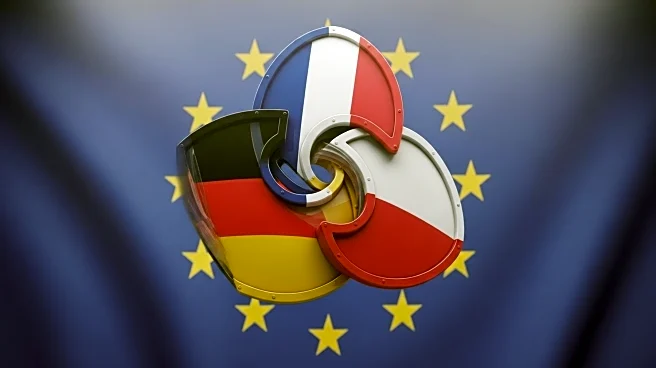What is the story about?
What's Happening?
Germany, France, and Poland have issued a joint statement advocating for stronger European integration to counter Russian aggression, particularly through enhanced defense ties with Ukraine. The statement was made following a trilateral meeting in Warsaw, where the foreign ministers of the three countries emphasized the need for swift progress in EU accession negotiations with Ukraine. They proposed opening a negotiation cluster focused on fundamentals such as rule of law and anti-corruption measures. The ministers also condemned recent Russian airstrikes on Ukraine and pledged continued support for Kyiv, including increased military aid and air defense systems. Additionally, they supported the EU's proposed 19th sanctions package targeting companies aiding Russia's war efforts and called for a full embargo on Russian liquefied natural gas.
Why It's Important?
The joint statement by Germany, France, and Poland underscores the growing European resolve to support Ukraine against Russian aggression. This move is significant as it highlights the shift in European defense policy, traditionally viewed with skepticism by individual nations. The proposed sanctions and defense integration efforts could strengthen Ukraine's position and deter further Russian advances. The initiative to leverage frozen Russian assets for Ukraine's benefit also signals a commitment to holding Russia financially accountable for the conflict. This development could lead to increased pressure on Russia and potentially alter the geopolitical landscape in Europe, affecting energy markets and international relations.
What's Next?
The next steps involve the implementation of the proposed sanctions package and the negotiation of Ukraine's EU accession. The countries involved will likely intensify efforts to counter Russia's shadow fleet in the Baltic Sea and ensure full enforcement of sanctions. The EU's initiative to use frozen Russian assets for Ukraine may face legal and diplomatic challenges, requiring careful navigation. Additionally, the ongoing tensions between Poland and Ukraine over grain exports and the Franco-German cooperation on defense projects may influence the pace and success of these initiatives.
Beyond the Headlines
The push for deeper European integration in defense matters reflects a broader shift in EU policy, driven by the need to respond to Russian aggression. This could lead to long-term changes in how European nations approach security and defense, potentially reducing reliance on NATO and the U.S. The focus on leveraging frozen Russian assets raises ethical and legal questions about the use of such funds, which may set precedents for future conflicts. The emphasis on rule of law and anti-corruption measures in Ukraine's EU accession process highlights the importance of governance reforms in strengthening European unity.















